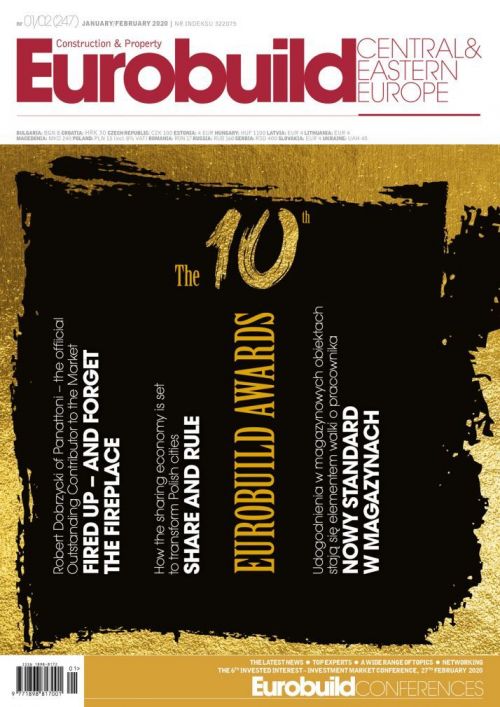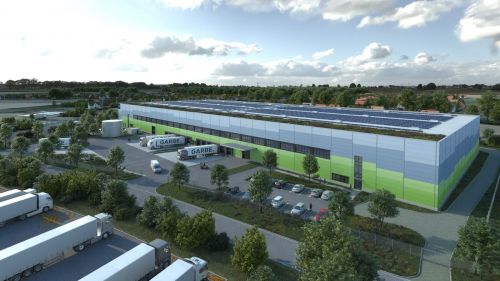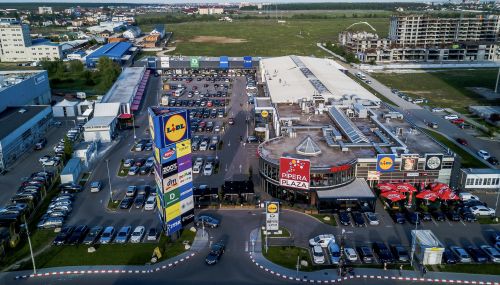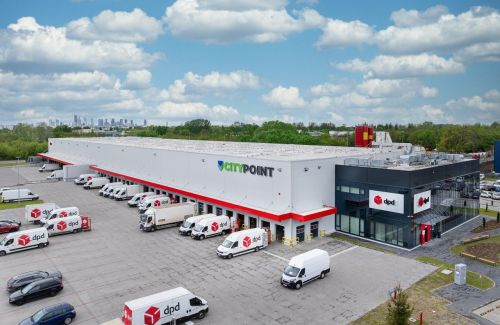Share and rule
Feature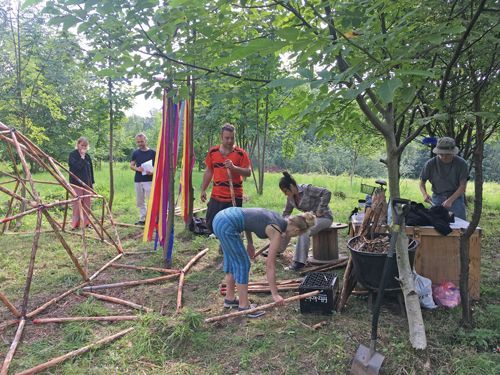
The sharing economy has up to now been associated mainly with Uber, Airbnb and BlaBlaCar. However, this is just a small slice of a much broader phenomenon that is now changing the entire economy to the extent that for some people it has even become a way of life. It is already becoming difficult to find a sector yet to feel the influence of this trend. It’s little wonder then that ‘Time’ magazine has included the concept as one of ‘the 10 ideas that will change the world’. It is now a way to save money, protect the environment and energise the local community. What was impossible just a few years ago is becoming a reality today. With the internet, we no longer need to own certain resources in order to use them. In Barcelona people can use a special platform through which they are able to help each other out with various household chores as well as looking after children and the elderly. The hours its users spend on such tasks are recorded on the app, and the total balance of the time between jobs done by and for each user is almost always close to zero. Meanwhile, in Amsterdam similar apps have become popular for sharing private storage rooms and basements and for children to swap their toys with each other. Another app has been developed for hiring cars left at airports, a service which is paid for but cheaper than traditional rentals. More and more cities are also creating digital libraries that give access to information about the free availability of goods and services. Garden sharing is another idea that has also been gaining popularity in cities, offering a remedy for the shrinking amounts of greenery in urban areas.
In order to fully exploit the potential of the sharing economy, local authorities have been launching special programmes and opening offices where long-term development strategies are drawn up. Seoul, Vienna, Denver and Copenhagen are among those that have decided to take such a step. In Denmark the plan is to gradually transform the entire economy through sharing.
Third time lucky
Polish cities are also seeing the benefits of the sharing approach – mostly in regard to transport and mobility. A genuine transport revolution has taken place in Polish cities recently. City bike rental chains appeared first (Veturilo, Wavelo and Next Bike), then scooter hire (Blinkee and JedenŚlad), which was followed by electric car rental. As a result, by-the-minute car hire companies now operate in Warsaw, Gdańsk, Wrocław, Kraków and Poznań. “Traficar and Panek provide by-the-minute car-sharing, while MiiMove was the first in the TriCity to add electric cars to its fleet. In 2019 its pilot programme comprised ten Vauxhall Amperas, but from 2020 its range of electric cars will include around 150 vehicles. The city and companies in this field work together to install electric car charging stations in locations most often used by car-sharing customers,” explains Maurycy Rzeźniczak, the mayor of Gdynia’s spokesperson for electromobility. Gdynia has also introduced its CoBiUM (Cargo Bikes in Urban Mobility) scheme, which can be used by local businesses, institutions and NGOs for 28 days free of charge. Such bikes can be used to transport goods between branches or for deliveries, first and last mile transportation, order fulfilment and business promotion. “The main goal of the project is to reduce car traffic and noise in urban areas. Under the CoBiUM project, we will also be carrying out research and pilot programmes involving employees of Gdynia city council, local government units and small businesses,” reveals Maurycy Rzeźniczak.
And then there is bike-sharing, such as the Mevo metropolitan bicycle system, which was also being rolled out in the TriCity until recently. This was also the first shared electric bikes schemes in Poland and one of the largest in Europe. The entire Gdańsk-Gdynia-Sopot Metropolitan Area (including a total of 16 administrative districts) were involved but unfortunately, at the end of October the TriCity claimed there had been a breach of contract and terminated its agreement with the system’s operator, NB Tricity. The bikes will now not be seen on the streets until a new operator is found.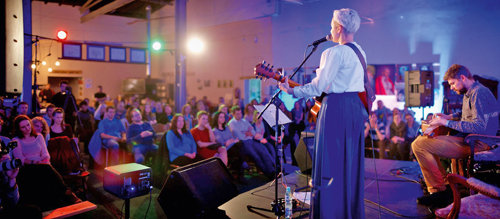
Lubartowska 77 is a creative zone established by people passionate about sharing
Creating an ecosystem
“Sharing in Polish cities is most noticeable in the transport and wider mobility sector,” insists Katarzyna Duma of Lublin city council’s press office. The Lubelski Rower Miejski bicycle hire system has been operating in the city since 2014. At the beginning it comprised 40 stations and 400 bikes. There are now 97 stations and almost a thousand bikes, while the number of rentals was over 745,000 last year. Car-sharing services are also appearing in Lublin. “However, the growth of this is commercial as it is provided by private companies. Nevertheless, it is still helping to form a mobile services eco-system. To support such enterprises in Lublin, all hybrid and electric vehicles are exempt from city parking fees,” adds Katarzyna Duma. There are three separate car-sharing schemes in the city. One is provided by Panek, which rents out passenger cars by the minute. City Bee is similar, but also has van rentals. And then there is the Blinkee.city scooter hire service in the city, provided by Green Electricity.
In Kraków, meanwhile, two companies have signed contracts with the city council to install electric car charging stations: Smart City Polska and Go+EAuto. “This is a commercial investment, so the city will not incur any financial costs to do this. There is currently a Smart City Polska station on pl. Na Groblach as well as Go+EAuto stations in such locations as the Zakopianka and M1 shopping centres, ul. Bulwarowa, ul. Praska and ul. Siewna. Kraków city council has also drawn up a map of possible locations for electric vehicle charging stations. The criteria for their placement included the number of parking spaces in their vicinity and the right to use the property. The map has now been submitted to the Kraków Road Authority and Kraków’s individual district councils. When the public charging station chain has been developed in the city, electric car rentals can then be launched,” explains Małgorzata Tabaszewska of the social communication department of Kraków city council.
According to PwC, car-sharing is set for double-digit growth over the next few years. By 2030, shared cars are expected to make up at least 30 pct of all cars across Europe.
“We have become a vast machine for consumption and generating waste,” points out Joanna Tobolewicz, the mayor of Gdańsk’s representative for energy
Share a book, food and gear
The rapid development of car-sharing services is not the only activity Polish cities are engaging in as they embrace sharing. One of the oldest initiatives of this sort is book-crossing – the exchange of used books. Such schemes have now become a common feature of many Polish cities, where special points have been set up (such as tables, bookcases and shelves, in clinics and even at public transport stops), where you can freely leave your books for others to take and where you can pick one up if it takes your fancy. One example is Drugie Życie Książki [The Second Life of the Book] in Kraków. “Book-crossing shelves and bookcases marked with the campaign’s logo can now be found at the Tourist Service Centre at ul. Powiśle 13, at St Lazarus Hospice at ul. Fatimska 17, in the Wyspiański Pavilion on pl. Wszystkich Świętych 2 and in the Ruczaj Cultural Centre at ul. S. Rostworowskiego 13),” reveals Grażyna Rokita of Kraków city council’s press office.
In Bydgoszcz, the book-crossing points are in such places as parks, recreational areas and squares. “Residents can leave the books they no longer want and in return take others,” explains Marta Stachowiak of Bydgoszcz city council. Another nationwide campaign, Wymiana Ciepła [Heat Exchange], has also been catching on in the city. This is a network of points where you can leave unwanted clothes. There are already six such points in the city. To find your closest drop-off point, just go to Wymiana Ciepła’s Facebook page, which has the latest map of locations of existing clothing exchange points in Poland, as their number continues to grow.
Food-sharing points, where people can (as the name suggests) share food, have proven just as popular as Wymiana Ciepła points. The first food-sharing location in Poland was opened in Warsaw in 2016 by Agnieszka Bielska and Karolina Hansen, the founders of Jadłodzielnie w Warszawie [Food-sharing Warsaw]. Following this, food-sharing locations started to emerge in other cities across Poland.
Last year saw the appearance of public refrigerators on the streets of Wrocław, where anyone can leave or take away food. The social refrigerator principle also fits into the food-sharing concept, which in practice resembles street book-crossing. The only requirement is that the food is packaged and within its expiry date.
Cooperatives also play an important role in food-sharing and the promotion of zero waste. “One of these is Wawelska Kooperatywa Spożywcza [the Wawel Food Cooperative], which is an informal organisation whose members together buy food directly from the producers, bypassing intermediaries, while exchanging with them their own products,” explains Grażyna Rokita of Kraków city council. Targ Pietruszkowy [the Parsley Market] has been operating in Kraków’s Podgórze district in a similar vein since 2013 and has since become highly popular.
Space for those with a passion
The Bydgoszcz Centre for the Support of Non- Governmental Organisations and Volunteering is also providing modern space for non-governmental organisations where both formal and informal project meetings can be held. “Anyone interested can receive free, consulting support as well as the space they require. The centre provides free rooms – such as workshop rooms, exhibition space, conference rooms, coworking rooms, individual work rooms and meeting rooms – lockers, computer equipment and a correspondence address,” explains Bydgoszcz city council spokesperson Marta Stachowiak.
NGOs can also use the rooms provided by the Warsaw Centre for Support of Non-Governmental Organisations in several locations across the capital city free of charge. In these they are given access to amenities such as laptops, multimedia projectors, flipcharts and a fully-equipped kitchen.
Some cities are also making space available to local artists. The Ładno studio, which operates as an open place for creative work, was founded a year ago in Lublin with the support of the city council. “The studio is a space for artists, graphic designers, photographers and other designers to collaborate. The goal is to support cultural initiatives and promote the arts and artistic education, as well as the social activities that take place within it,” insists Katarzyna Duma of Lublin city council. In her opinion, the change to a sharing economy can also be seen in the grassroots initiatives of local residents. “In Lublin, such activities include the Lublin Cooperative, an initiative by consumers who want organic food and dairy products as well as natural cosmetics available directly from farmers and producers. A similar example is Lubartowska 77, a creative place established by people passionate about sharing. At weekends it runs an eco-market for local food producers, while on weekdays workshops are held on a wide range of topics, ranging from culinary themes to ceramics,” she explains.
Bike rental points now exist in many different cities in Poland
Sharing in the city
Warsaw has adopted a systemic approach to the sharing trend. Its shared smart city concept will be laid out in the key documentation to #Warsaw2030 Strategy. “We are at the stage of mapping out sharing economy projects. The material drawn up will be used to devise executive programmes for the #Warsaw2030 Strategy. It will address a number of issues from social innovation, and stimulating economic growth, to improving communication with local residents, construction and transport, as well as issues related to the climate and energy,” reveals Marta Plasota of Warsaw city council. In her opinion, the areas identified for sharing in the city will include: urban mobility (e.g. car-sharing, scooters, bicycles and public transport), common space (offices, community centres, car parks and green areas), common goods (e.g. the sale, exchange or rental of items using online platforms) and food-sharing (food and beverage cooperatives). Warsaw also wants to include energy sharing (e.g. generating, storing and sharing renewable energy, as well as providing electric vehicle charging stations) and economic resource and knowledge sharing. “An intelligent city has to be both modern and close to its inhabitants – this is how we see Warsaw and this is how we will develop it. We are now at the third stage of developing smart cities, which are those that are integrated with the sharing economy. A modern smart city means, therefore, a shared city that is created by its residents,” explains Marta Plasota.
Sharing as a way of living
According to the YouthSpeak 2015 report by PwC and AIESEC, it is Generation Y, commonly referred to as Millennials, who are the driving force behind the growth of the sharing economy. This generation values independence and is much more flexible than its predecessors. A typical member of it is open to people but also looking for more cost-effective approaches.
In the view of Joanna Tobolewicz, the representative of the mayor of Gdańsk for energy, the main reason for promoting the sharing economy today is basically the need to combat the excesses of consumerism and the enormous amounts of waste it generates. “We now know that humans are directly contributing to global climate change. We have become a vast machine for consumption and generating waste. Huge amounts of carbon dioxide and pollutants are pumped into the atmosphere as a result of industrial development, extensive road transport and the increase in the availability of air transport. Meat production has also increased. Industrial-scale farms pollute the environment and consume huge amounts of water. It is estimated that a third of the food produced is thrown away. The average life expectancy of an everyday device is less than its warranty period. We no longer mend small home appliances because they cannot be repaired. The fashion for clothing changes several times a year, but the clothes themselves are generally produced cheaply in Asia, in scandalous conditions and this does not encourage investment in good quality clothing or footwear that is worth repairing later,” argues Joanna Tobolewicz.
In her opinion, one of the ways to reduce this phenomenon is sharing. “And I don’t mean car hire for a few hours or electric scooters on the pavements, but real rentals. This includes household appliances, tools, sports equipment, prams and furniture for children, and sport and tourist gear. A more extensive network of rentals will make life easier for people, reduce unnecessary expense and unclutter our apartments, basements and storage rooms,” she adds.
At the same time, she hopes that the popularisation of sharing will also force state and local authorities to take a firmer stance on reducing the production of disposable washing machines, refrigerators and vacuum cleaners. Furthermore, it should generate new jobs related to repairs and maintenance. “And all of this should contribute to reducing adverse climate change and the pollution of the natural environment,” concludes Joanna Tobolewicz.
Mateusz Strzelecki
the head of regional markets at Walter Herz
Access not ownership
The technological progress we have been seeing is resulting in new forms of economic activity, in transport, tourism, accommodation, finance and services. The development of the digital economy goes hand in hand with a transformation in socially accepted values, especially when it comes to Generation Y, for whom access is increasingly more valued than ownership. The sharing economy will play a crucial role in this. People and businesses have resources that are not fully exploited and that can be better employed through wider use and circulation. Exchanges can be made and micro-services provided, using smartphone apps. Sharing goods can also reduce the pernicious impact of transport on the environment. In addition, the mutual exchange of services can be used to assist in various kinds of work – in the garden, at home, or when it comes to childcare or caring for the elderly. Cities like Amsterdam have a register of municipally-owned property – including machinery, equipment, halls, sports fields and parks, which can be made available to the public. The sharing economy in Poland is in its infancy in the country’s largest cities, but tthese forms of services will continue to grow in importance and their projected turnover is set to increase twenty-fold worldwide over the next 25 years.
























